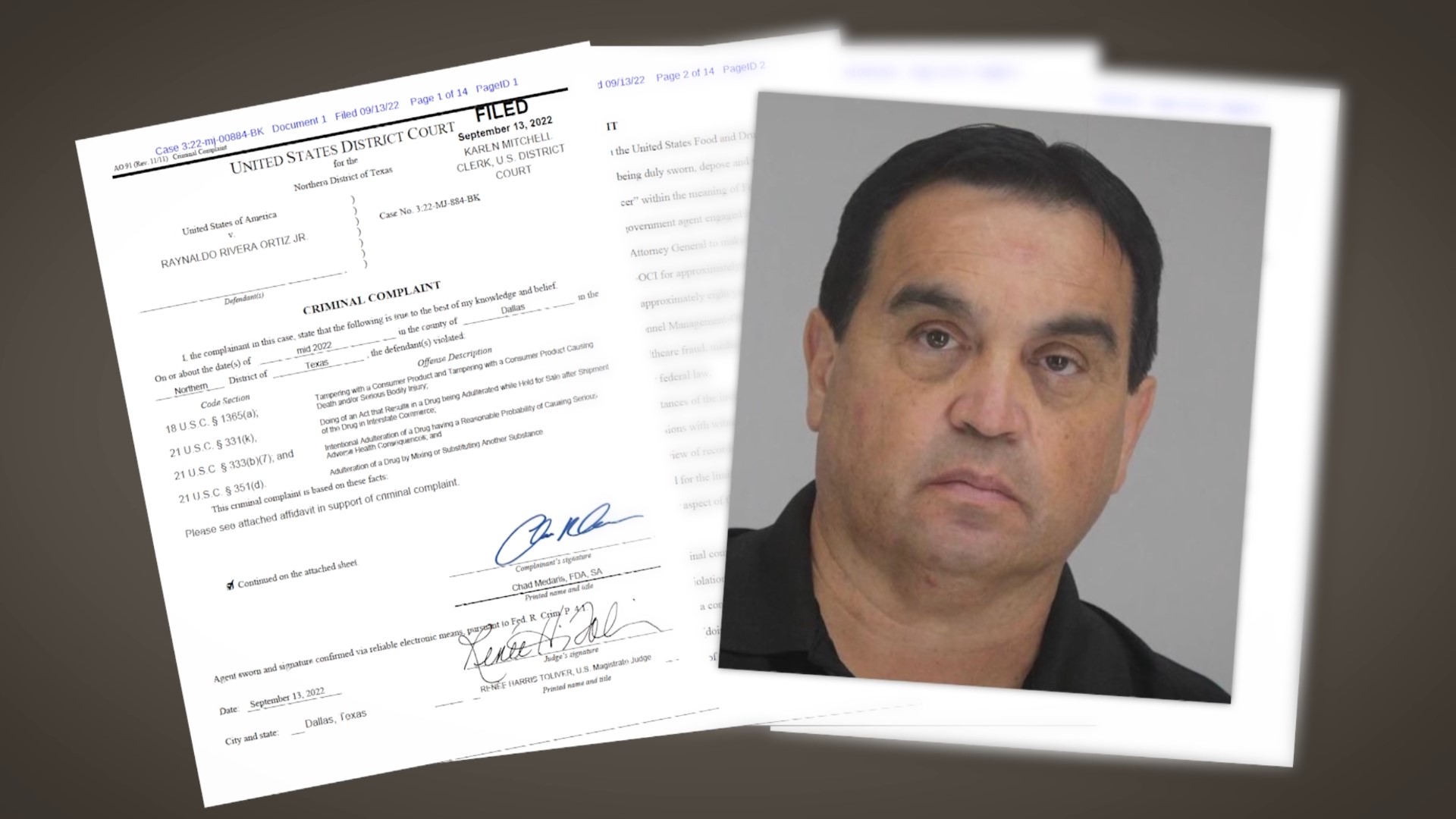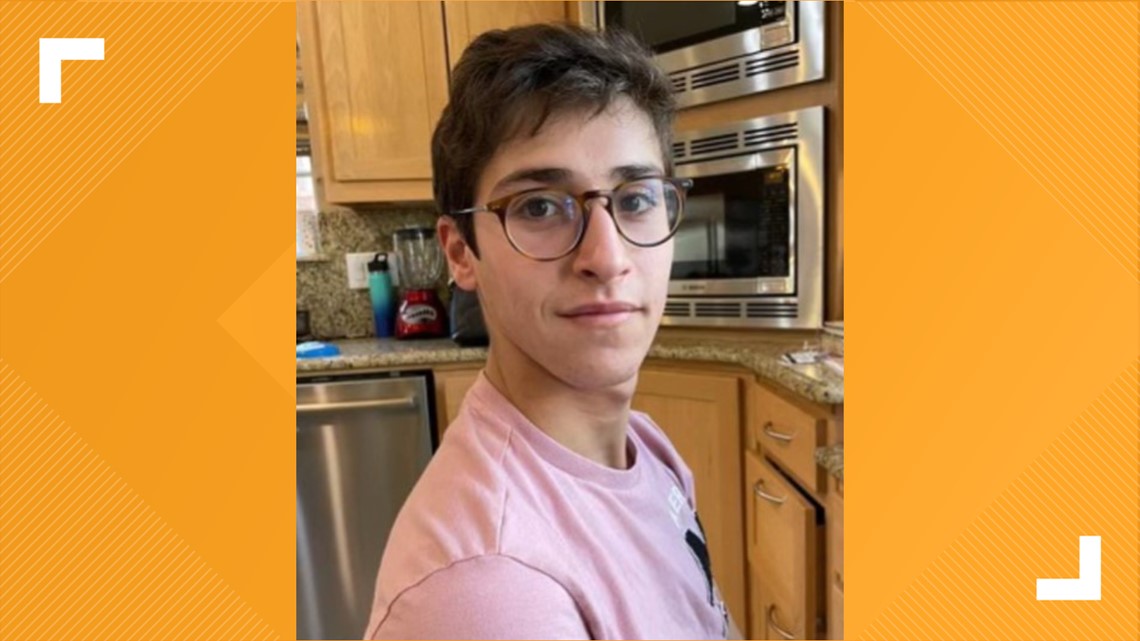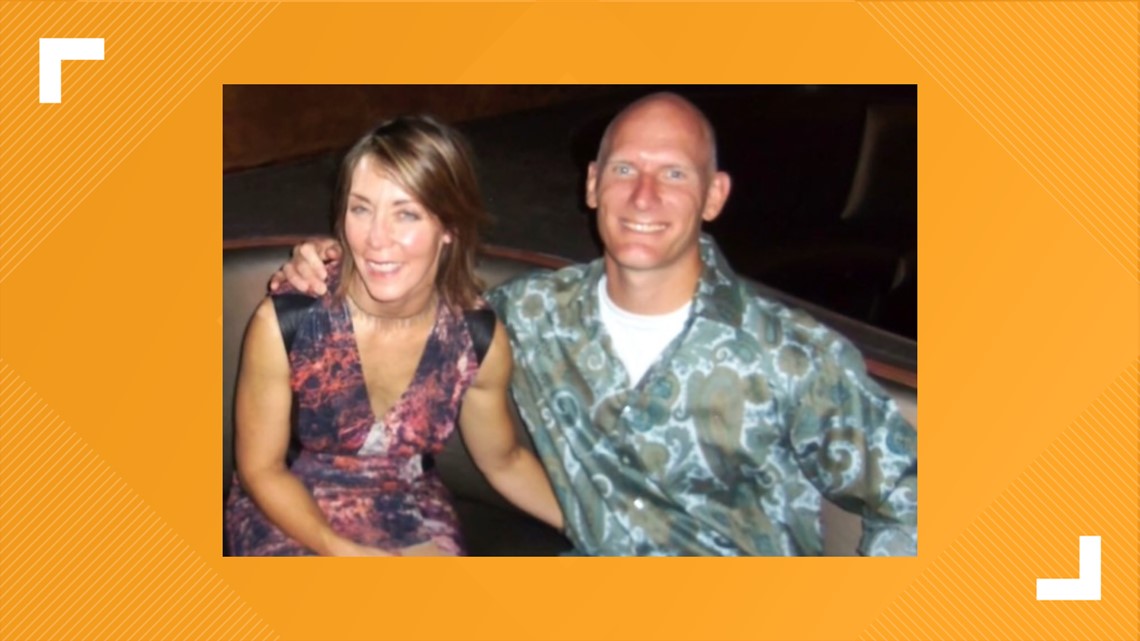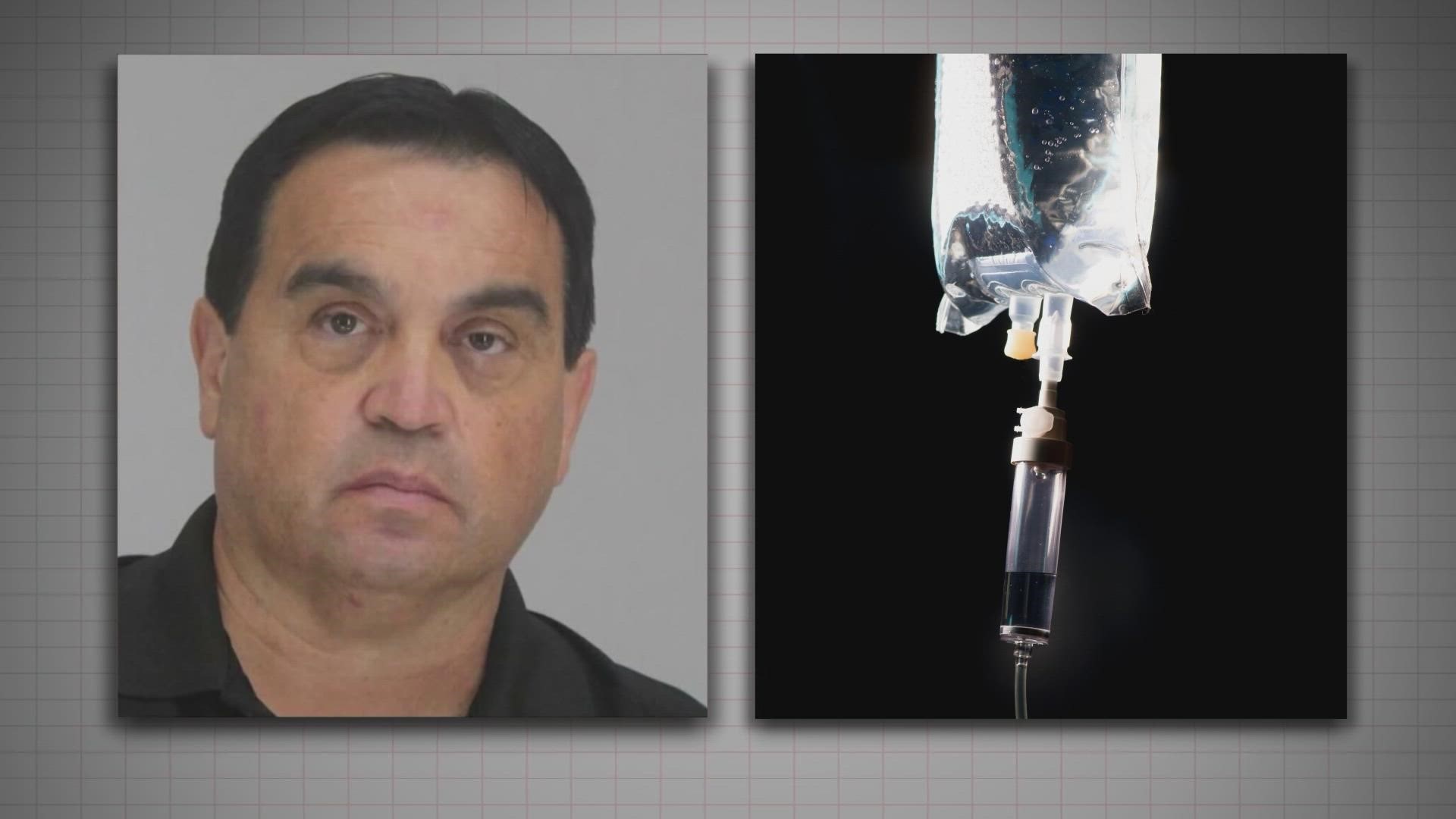EXCLUSIVE: 'All that stuff... was a lie' | In jailhouse interview, North Dallas doctor denies he poisoned IV bags
Dr. Raynaldo Ortiz, who faces up to life in prison if convicted, says surveillance video evidence of him at an IV warmer is misleading.

Dr. Raynaldo Ortiz was eager to tell his side of the story.
The Dallas anesthesiologist accused of poisoning patients called WFAA from the Limestone County Detention Center.
“All that stuff that they said was a lie,” Ortiz said. “I’ve had no lawsuits, no malpractice in 29 years, not one.”
In a more than 30-minute telephone interview, Ortiz said he’d been set up, that he’d done nothing wrong and cast aspersions on the people he once worked with. He said his troubles began after he reported another medical professional for alleged sexual misconduct.
Ortiz spoke one day before he was due to appear in a Dallas federal court to be arraigned on 10 felony counts related to allegations that he tampered with IV bags. He’s pleaded not guilty to the charges.
According to a criminal complaint, for three months -- from May to August of this year -- 11 people who came for routine outpatient surgeries suffered cardiac episodes on the operating tables at Baylor, Scott and White’s Surgicare North Dallas facility on Coit Road. The episodes typically occurred during longer surgeries when hospital staff retrieved additional IV bags from a warmer, the complaint said.
While Ortiz wasn’t the anesthesiologist in any of those routine surgeries, prosecutors allege he tampered with IV bags.
According to the criminal complaint, the cardiac episodes began in late May, days after Surgicare North Dallas officials notified Ortiz he was being investigated for the circumstances surrounding a May 19 surgery. The complaint said a facility review found “Ortiz deviated from the standard of care by failing to maintain the patient’s airway and failing to document critical aspects of the incident.”
“He expressed to a fellow doctor that (Surgicare North Dallas) was trying to ‘crucify’ him,” the criminal complaint said.
The criminal complaint also said that investigators obtained four hospital surveillance videos purporting to show Ortiz placing IV bags in a warmer for use in surgeries. Four times after nurses pulled IV bags from it, a patient experienced a cardiac episode.
Dr. Ortz told WFAA that the surveillance videos are not what they seem.
He said before surgeries, an anesthesia tech sets up the operating room and brings in IV bags.
“An hour, two hours later, that bag is cold because it’s been sitting out, so I take it back (to the warmer),” Ortiz said.
Ortiz also said that surgical supplies – including IV bags – would frequently sit out in the hallway for days. “This stuff that’s outside is not even locked away,” he said.
However, the criminal complaint says that facility personnel told investigators that IV bags taken into an operating room "would not be brought back out into the hallway and placed in the warmer.” The surgery center’s staff also said that the warmer is stocked by staff members from cardboard boxes of IV bags and doctors, including anesthesiologists, at the facility do not typically place IV bags in the warmer.
A nurse also told investigators that she recalls she retrieved an IV bag from the warmer to use during an August surgery, but Ortiz “strongly refused to use the bag and physically waived the bag off.” She also said that around that time, Ortiz retrieved his own bags for use during his procedure, which was unusual.
Although investigators identified 11 patients affected, he was only indicted for four patients who underwent surgeries in August.
Those four patients range from 18 to 78 years of age.
Chapter 1 Minor surgery gone wrong
One of them was Dr. Daniel Wohlgelernter’s grandson Jack, who was having minor surgery for a sports-related injury.
“Jack is 18 years old, healthy, athletic, no medical problems,” Wohlgelernter said.
Wohlgelernter said Jack’s father called and said there had been a serious cardiovascular crisis in the operating room. The surgeon aborted the surgery. Jack was taken to the emergency room and placed on a ventilator for life support.


“Jack's mom, my daughter, asked one of the doctors ‘Is he going to make it?’ The answer was, 'Well, (there’s a) 50-50 chance,’” Wohlgelernter said.
Wohlgelernter, a Los Angeles cardiologist, said Jack’s blood pressure “went sky high” and had to be lowered with drugs.
“It became the world’s worst rollercoaster because his blood pressure became very low and they had to administer powerful medications to raise his blood pressure,” he said.
Based on his knowledge, he said he immediately knew epinephrine – more commonly known as adrenaline – could be the only drug to cause that kind of spike in blood pressure.
“Of course, I had no reason to suspect that this was done intentionally, maliciously,” he said. “That line of thinking came out subsequently, to our horror.”
His grandson spent about four days in the hospital.
Records show he was the last of 11 patients to experience cardiac “complications during otherwise unremarkable surgeries.”
“When there are unpredictable, unexplained episodes of serious complications, how do you let more than one go by?” Wohlgelernter said. “How do you not just put a pause on everything?”
Chapter 2 A doctor dies
The indictment also says Ortiz’s actions caused the death of a fellow anesthesiologist, Dr. Melanie Kaspar, 55, who also worked at Surgicare North Dallas.
In June, Dr. Kaspar was feeling sick and dehydrated. She took an IV bag home to give to herself, when she suffered a cardiac episode and died. Her cause of death was not determined for two months.


Her husband, John Kaspar, saw her die.
“It is the most agonizing thing I've ever seen in my entire life,” he said after one of Ortiz’s court hearings.
On Aug. 24, tests came back showing Dr. Kaspar died from toxic efforts of an anesthetic called bupivacaine. That’s also the same day that Wohlgelernter’s grandson nearly died in surgery.
Baylor shut down their outpatient surgical facility the same day.
The criminal complaint says testing later revealed that two anesthetics and epinephrine were found in an IV bag used in Jack’s surgery.
During the interview, Ortiz said local anesthetics are kept locked up in the pharmacy and access is restricted.
Baylor officials said in a statement that “anesthesiologists are authorized users of IV fluids and medications such as lidocaine, adrenaline and bupivacaine in a surgical care setting.
“Those commonly used IV fluids and medications must be made readily available to authorized users for patient care,” the statement said. This is industry standard.”
Investigators found two other tainted IV bags in the facility’s warmer, according to the complaint.
“The buck stops at the hospital,” said former Texas Medical Board member Dr. Allan Shulkin. “I think the hospital failed because they allowed … surgery operations to continue without understanding what was happening.”
Shulkin, a Dallas pulmonologist, said the hospital should have shut down much sooner.
“This is an outpatient facility,” he said. “These are healthy people and you’ve got a cluster of people who require emergency transfer ... That makes no sense ...Talk about the red flags.”
WFAA wanted to know if any of these cardiac episodes were reported to the state.
The answer is no. They were not reported because they did not have to be.
Only “preventable adverse events” must be reported to the Texas Department of State Health Services. An official with the agency told WFAA that what happened this summer at Surgicare North Dallas does not qualify.
“There is no state agency looking out for patient safety in Texas,” said Dallas medical malpractice attorney Kay Van Wey, who is not connected to the Ortiz case.
Chapter 3 Past troubles
Van Wey and other experts say Ortiz’s history with Baylor is equally concerning.
In November 2020, a patient suffered “suffered serious complications during anesthesia” at Baylor’s North Garland surgery center, according to federal court records. Several months later, in April 2021, Ortiz relinquished his medical staff and clinical privileges at the center. According to the medical board’s findings, the patient needed CPR and he didn’t act appropriately.
“What I've seen over and over and over again, in medical malpractice cases, is that great deference seems to be given to the physicians’ rights, and they want to give the physician due process,” Van Wey said. “But in the meanwhile, what about the poor patient?”
Van Wey said doctors are often allowed to resign in order to skirt the legal obligation to report them to the National Practitioner Data Bank, which “results in other hospitals not being warned.”
She also questioned why Baylor continued to let Ortiz work at Surgicare North Dallas after he was told he was under investigation in May for allegedly failing to maintain an anesthesia patient’s airway and failing to document aspects of the incident.
As both a doctor and grandfather, Wohlgelernter was infuriated by Baylor’s actions.
“This is just incomprehensible and frankly unforgivable,” he said. “He’s already had at least one patient safety episode. You can’t just let that pass.”
In a statement, Baylor officials said the facility reported its investigation into the Nov. 2020 surgery to the Texas Medical Board, which led to the the medical board’s investigation and an agreed order between the medical board and Ortiz on Aug. 19.
“Dr. Ortiz was required to report the August 2022 TMB Agreed Order to Surgicare North Dallas and the other facilities at which he held privileges,” the statement said.
The statement did not address why he was allowed to continue working at the North Dallas location.
Ortiz defended his actions in the Garland case.
“That guy was a morbidly obese man,” he said. “He was not healthy. He coded. I did everything we could.”
Ortiz said he only gave up his privileges at the Garland facility because that’s what his attorney advised him to do.
“He said it was probably better to resign under investigation than privileges revoked,” Ortiz said. “So that's what we did. “
In a statement, Baylor officials told WFAA that experts reviewed the facility’s “protocols and procedures, which confirmed the accessibility of medications and IV bags at the facility were in line with industry standards.”
The statement also said that the facility “resumed normal operations more than four weeks later, only after an extensive investigation and the issuance of the Department of Justice’s criminal complaint.”
“The DOJ noted that investigators believe the problem was limited to one individual who has been arrested,” the statement said. “We are committed to delivering safe, high-quality care, and there is nothing more important than the well-being of those we serve.”
During the WFAA interview, Ortiz also had an explanation for the $7,000 in cash that was found on him when he was taken into custody. He said he had the money in the car because he needed to give it to his son’s basketball coach for the team’s scrimmages.
Ortiz denied he was trying to flee the country and said he would never leave his son.
“I’ve never left the kid. Ever,” he said.
Ortiz issued a plea as the call ended.
“Thank y’all for your time,” he said. “Say a prayer for my family. But please do what you do best. Please. I beg you.”
Email investigates@wfaa.com


